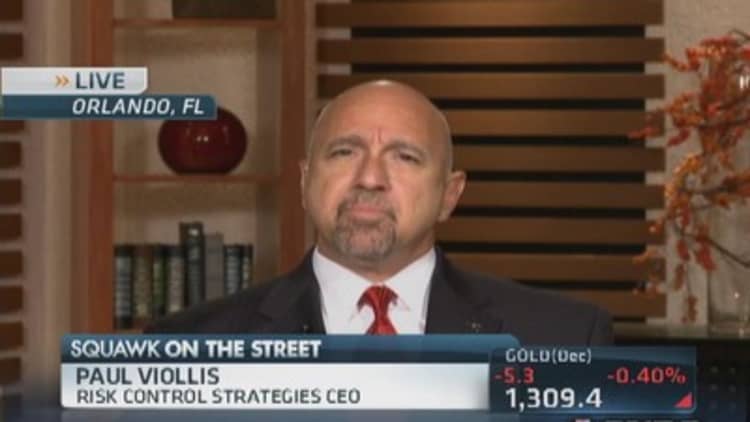This is the time of year that retailers want you thinking about Santa Claus and presents, but two recent mall shootings may be fresh on consumers' minds as the critical holiday season kicks off.
On Monday, a gunman opened fire at New Jersey's Garden State Plaza. The suspected shooter killed himself before anyone else was hurt. That incident, coupled with the September terrorist attacks in Nairobi that left more than 60 people dead, may have stirred up questions among shoppers about how safe it is to head to a shopping center.
People are taking fewer trips to the mall as it is. Overall retail traffic has been trending lower over the past decade, as more shoppers go online. Analytics firm ShopperTrak predicts retail traffic will decline 1.4 percent this holiday, though founder Bill Martin said it's important to note that the number of unique shoppers has remained relatively flat over the past 14 months.
Retailers will need to perform the delicate task of calming concerns without fanning any fears.
Shopping centers take a number of measures to prevent and handle attacks, according to Malachy Kavanagh, vice president of communications and external relations at the International Council of Shopping Centers.
Major centers practice evacuation and training drills throughout the year, and perform shooter training drills with police officers, Kavanagh said.
Local police have become more active in creating informational materials, including videos and posters. They also work with private security teams and often have centers located within the malls. Police presence is increased during the holidays, he said.
Further, camera systems have been updated and in many cases let police remotely access security feeds and get live pictures from the scene of a crisis. The largest malls often spend more than $2 million a year on security, Kavanagh said.
"It's a constant evolution as the situation dictates, and you have to train for the inevitable," he said.
(Read more: Authorities say suspect in N.J. mall shooting is dead)
Kavanagh said retailers' overall training has been evolving in the past 12 years. After Sept. 11, ICSC spent $2 million to develop a training course on how to respond to a terrorist attack.
The National Retail Federation has also taken steps to promote safety within the industry. In 2011 the group produced an information packet with the Department of Homeland Security detailing emergency response protocols and guidelines when dealing with an active shooter.
Information includes the profile of a typical shooter, basic guidelines and considerations, and how retailers can prepare. It also features a risk assessment form to identify the best response plan for a particular retailer, and whether it is better to evacuate or seek shelter in a certain situation.

Paul Viollis, CEO of Risk Control Strategies, told CNBC that retailers' response to shooting incidents must be measured. While more aggressive tactics—such as installing metal detectors—could have avoided Monday's attack, he said, they could also discourage people from going shopping in the first place.
"The last thing we want to do is have a knee-jerk reaction and start throwing money at a situation that could actually deter shoppers and hurt retail," he said.
(Read more: Police search New Jersey mall for shooter)
Martin at ShopperTrak said that, just as with past incidents, the Garden State Plaza shooting probably will not affect sales or traffic on a national level.
Americans are "hearing the same story repeated day in and day out," he said, referring to other shootings. He predicted that the impact would be short term even locally.
Kavanagh at ICSC also predicted the incident would not move the national needle.
"People recognize that these things can happen," he said. "Unfortunately it's something that we're beginning to live with in this country."
The situation Monday was handled "extremely well," Kavanagh said. As soon as a person was identified with a weapon, security followed procedure. Shoppers evacuated the mall, the police department arrived quickly and the building was locked down. Separately, a senior law enforcement official told CNBC that the response was "textbook."
Eyewitness Joel Castaneda told CNBC, "When I noticed people running and screaming, that's when I was like 'Oh, what's going on?' And then we heard another gunshot. That's when everybody panicked." He and 12 others locked themselves in the back of a store for about two hours.
In a statement, Garden State Plaza's owner Westfield Group said, "Clearly, yesterday's event heightens everyone's state of awareness and concern. Our security precautions reflect that heightened state."
—By CNBC's Krystina Gustafson



